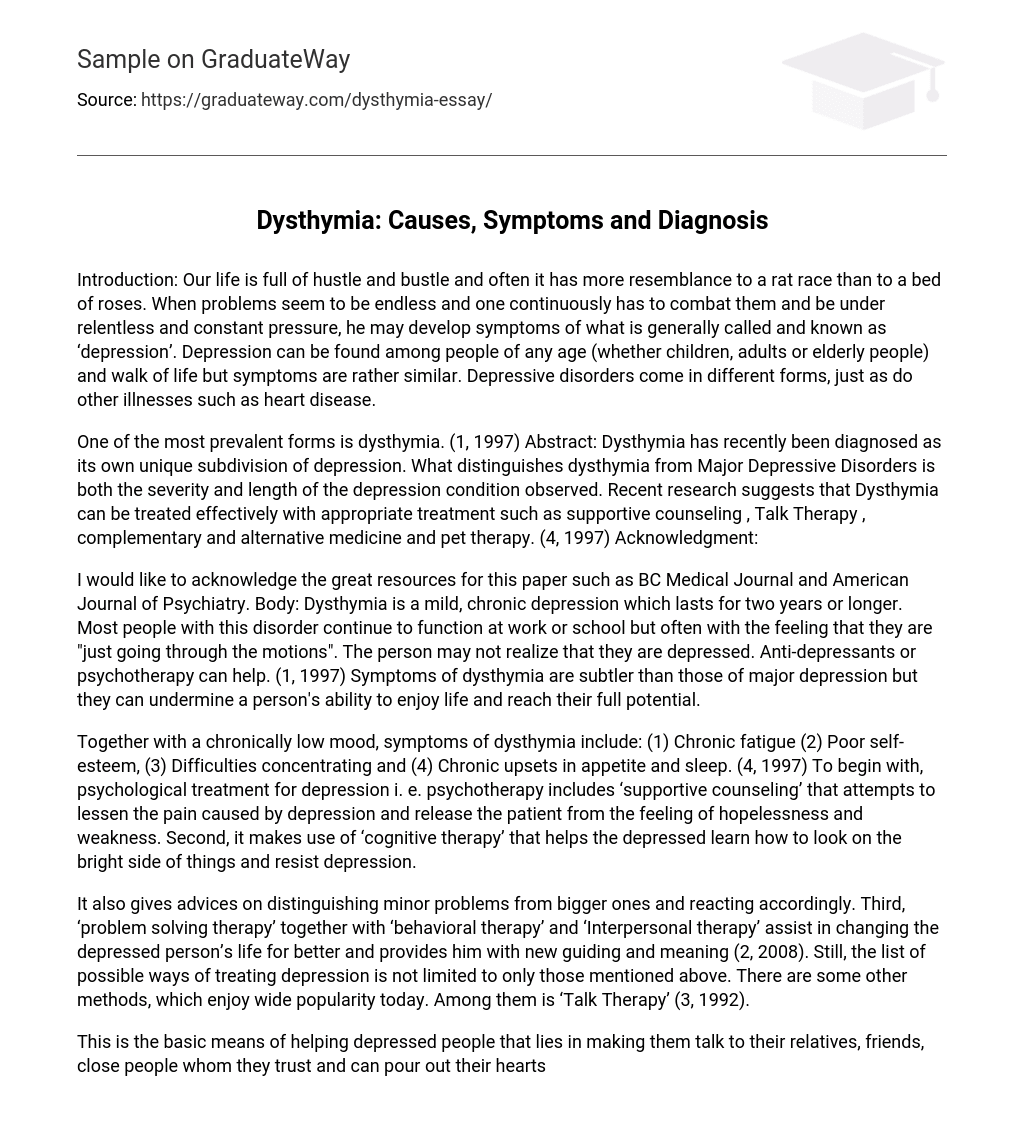Introduction: Our life is full of hustle and bustle and often it has more resemblance to a rat race than to a bed of roses. When problems seem to be endless and one continuously has to combat them and be under relentless and constant pressure, he may develop symptoms of what is generally called and known as ‘depression’. Depression can be found among people of any age (whether children, adults or elderly people) and walk of life but symptoms are rather similar. Depressive disorders come in different forms, just as do other illnesses such as heart disease.
One of the most prevalent forms is dysthymia. (1, 1997) Abstract: Dysthymia has recently been diagnosed as its own unique subdivision of depression. What distinguishes dysthymia from Major Depressive Disorders is both the severity and length of the depression condition observed. Recent research suggests that Dysthymia can be treated effectively with appropriate treatment such as supportive counseling , Talk Therapy , complementary and alternative medicine and pet therapy. (4, 1997) Acknowledgment:
I would like to acknowledge the great resources for this paper such as BC Medical Journal and American Journal of Psychiatry. Body: Dysthymia is a mild, chronic depression which lasts for two years or longer. Most people with this disorder continue to function at work or school but often with the feeling that they are “just going through the motions”. The person may not realize that they are depressed. Anti-depressants or psychotherapy can help. (1, 1997) Symptoms of dysthymia are subtler than those of major depression but they can undermine a person’s ability to enjoy life and reach their full potential.
Together with a chronically low mood, symptoms of dysthymia include: (1) Chronic fatigue (2) Poor self-esteem, (3) Difficulties concentrating and (4) Chronic upsets in appetite and sleep. (4, 1997) To begin with, psychological treatment for depression i. e. psychotherapy includes ‘supportive counseling’ that attempts to lessen the pain caused by depression and release the patient from the feeling of hopelessness and weakness. Second, it makes use of ‘cognitive therapy’ that helps the depressed learn how to look on the bright side of things and resist depression.
It also gives advices on distinguishing minor problems from bigger ones and reacting accordingly. Third, ‘problem solving therapy’ together with ‘behavioral therapy’ and ‘Interpersonal therapy’ assist in changing the depressed person’s life for better and provides him with new guiding and meaning (2, 2008). Still, the list of possible ways of treating depression is not limited to only those mentioned above. There are some other methods, which enjoy wide popularity today. Among them is ‘Talk Therapy’ (3, 1992).
This is the basic means of helping depressed people that lies in making them talk to their relatives, friends, close people whom they trust and can pour out their hearts, relieving in such a way pain and undermining stress. Whereas the task of those listeners is to gain openness and show concern for the people whom they love and who are suffering. Millions of people round the world take complementary and alternative medicine, which according to studies in many clinical trials and laboratory tests, may be an excellent alternative to those already existing and regarded as conventional (2, 2008).
The last but not the least way of treating depression and reducing stress is pet therapy. It is either a subsidiary kind of therapy, but it can yield good results. It has been proved that simple watching fish in aquarium can significantly reduce anxiety and such pets as dogs and cats can substitute family and become best friends, thus, overcoming the person’s loneliness and making sense of his life. (3, 1992) Conclusion: Though depression is an illness that affects millions of people of different ages and walks of life at every year, it can be treated effectively. And mankind has already employed several ways of treatment.
Among them are supportive counseling, which releases the patient from the feeling of hopelessness and weakness; cognitive therapy, which teaches the depressed people to look on the bright side of things and resist depression; problem solving therapy, behavioral therapy and Interpersonal therapy that show patients how to change their lives for better and make them meaningful. Furthermore, there are such alternative curing methods as talk therapy and its subdivision family therapy that consist in making patients can pour out their hearts to close people (for instance family members, friends, etc. ; CAM (which stands for complementary and alternative medicine) and pet therapy. To sum up, only combination of different approaches to treatment off depression can yield fruit and cure the patient and one should keep in mind that such therapy is not a instantaneous action but a long painful process requiring lots of care and patience as well as high professionalism of doctors. References: 1. Morrant JCA. Depression and Some Newer Antidepressants. BC Medical Journal, 1997 2. Depression Help: A brief introduction to treatment, Retrieved on March 30, 2008 from http://www. nxiety-and- depression-solutions. com/ 3. Beardslee WR, Hoke L, Wheelock I, Rothberg PC, van de Velde P, Swatling S: Initial Findings On Preventive Intervention For Families With Parental Affective Disorders. American Journal of Psychiatry, 1992 4. Hagop S. Akiskal, Giovanni B. Cassano: Dysthymia and the Spectrum of Chronic Depressions a division of Guilford publications Inc. , 1997 Translation Different: Alternative medicine: substitutes for chemical medication such as plants Depression: hopelessness, sadness Disorder: disarray, confusion Significantly: extensively Therapy: rehabilitation





